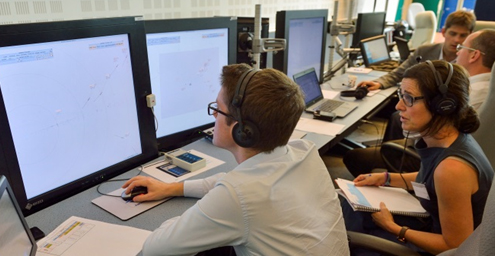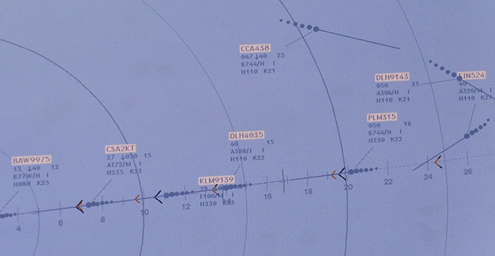PhD student Floris Herrema (Air Transport and Operations) recently won the SESAR Young Scientist of the Year Award for his MSc thesis ‘Compression on final approach and Time Based Separation (TBS) for Optimised Runway Delivery’. His work has had a direct impact on the knowledge and safety of TBS and the deployed TBS at London Heathrow Airport: the first in the world.

“I never expected to win the SESAR Young Scientist of the Year Award, so I was actually quite relaxed on the day of the final round in Bologna, Italy. Single European Sky Air Traffic Management Research (SESAR) is a European funding institute focused on air traffic management (ATM). This means I got to stand in front of 400 people in the field of ATM that day, which was great.”
Predicting aircraft behaviour
“The objective of my study was to quantify and model the potential performance compression improvements on final approach for Time Based Separation (TBS). The concept of TBS was known, but it was too complicated to actually implement it. I have developed a new air speed profile, the Floris Friso Herrema (FFH) tool, with which we can better predict the expected aircraft behaviour and TBS. This is very relevant information for air traffic controllers. It is now easier to understand and thus implement. And it was implemented at London Heathrow Airport last year, which is now the first TBS airport in the world.”
The advantages
“The most important advantage is the recovery we achieve during strong headwinds. It is still estimations based on Heathrow, but we expect that during strong headwinds we can achieve two more landings per hour. In addition, TBS is on track to save 80.000 minutes of delay per year. The benefits to the airlines can add up to 7.5 million pounds per year.”

Impact
“I was specifically looking for a thesis subject with potential impact. It is part of the reason why I wanted to work together with EUROCONTROL on this from the start. I combined a traineeship at EUROCONTROL together with my master’s project. You see without implementation, theory is just theory. This is also why it is great now working together with Ricky Curran and Dries Visser (both Air Transport and Operations) during my PhD project. With everything I do, they ask: what is the social and academic impact? The university and EUROCONTROL each give me feedback and advice that is always slightly different. There is certainly extra value in combining these views. I hope to always keep moving around in both worlds and be an active link between the two.”
Future
“My PhD project, ‘Big data analyses and machine learning at airports to support decision making’, is well underway. I am working on feasible machine learning techniques. The goal is to implement it at all major airports in Europe. I really enjoy working on this. Right now we are trying to embed my research in a European research project. We are working hard on a few proposals in the context of the Horizon 2020 programme to try and obtain funding for this. If we could achieve this, that would be great of course.”
The most important advantage is the recovery we achieve during strong headwinds.